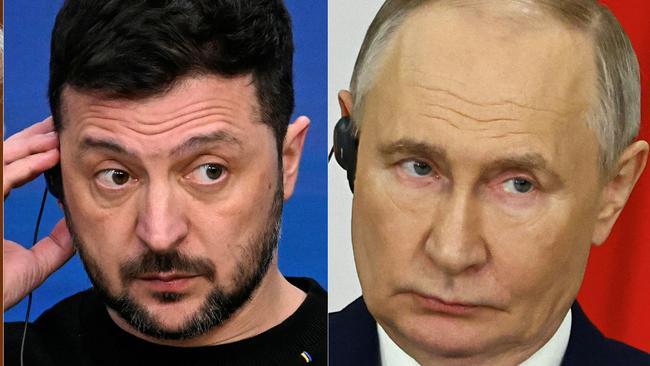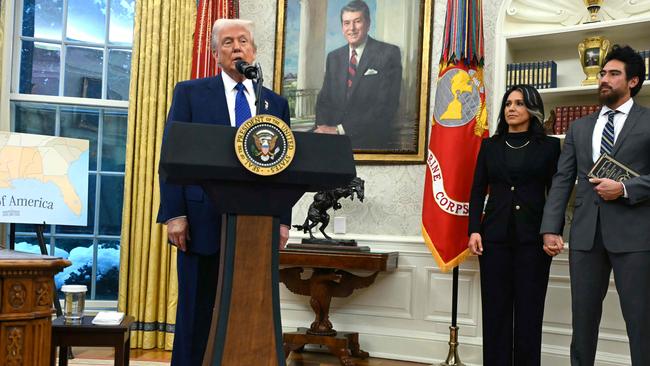
Both points were conceded by the Trump Administration ahead of peace negotiations even commencing, a sign that the US is prepared to take control and steer negotiations towards an outcome that suits America – rather than its European partners.
These were two major bargaining chips that appear to have been cashed in before all the players even took their seats, including at the Munich Security Conference scheduled for later this week.
Analysts fear a peace on this basis won’t last the test of time.
Trump is hoping to reset relations with Moscow. But he is also setting expectations for what is possible in any peace talks while giving Europe a reality check about what will be necessary to get Russia on board.
His push for immediate peace talks is the biggest thing the US President has done on the global stage and dwarfs the global import of Trump’s audacious Middle East diplomacy.
It shows him seeking to establish a new basis for security on the European continent while revealing more about the changing character of America under its new leadership.

The United States is now clearly turning its focus away from Europe, shifting more of the security burden onto the shoulders of NATO members and reaffirming its expectations that defence spending should be lifted to 5 per cent of GDP.
Demanding NATO members spend more is reasonable, but 5 per cent will be seen as unrealistic.
Trump wants Europe to bear the brunt of providing lethal and nonlethal assistance to Ukraine so he can focus his energies on winning the strategic competition against China in the Indo-Pacific and preserving the integrity of America’s own borders.
US Defence Secretary Pete Hegseth drew two clear lines in the sand while speaking at the Ukraine Defence Contact Group in Brussels.
First, that NATO membership for Ukraine following any peace negotiations is unrealistic and, second, that any insistence on a return to Ukraine’s pre-2014 borders will only “prolong the war and cause more suffering.”
Speaking in the Oval Office, Mr Trump backed-in both of those positions. Asked about NATO membership for Ukraine, he responded: “I don’t think it’s practical.”
This approach is already raising initial concerns about the nature of any future peace agreement in Europe.
Some strategic analysts are warning the conditions put forward by the new administration are stacked in Russia’s favour. A key question is whether any peace on this basis can last the test of time.
Daniel Byman, the director of the Warfare, Irregular Threats and Terrorism program at the Centre for Strategic and International Studies, told The Australian that a downgrading of Washington’s relationship with Kyiv was now very likely.
“These conditions favour Russia,” he said. “One of the Ukraine’s biggest worries is that if it makes peace, Russia will come back in five years — rearmed and ready — and invade again. NATO membership would guard against that. On the 2014 borders, allowing annexation would reward Russian aggression.”
Speaking to The Australian in December, former Prime Minister Tony Abbott said he thought Mr Trump should offer Ukraine NATO membership as part of any negotiated peace settlement. “It’s not perfect,” he said. “But in the real world it wouldn’t be a bad outcome.”
Former Australian Foreign Minister Bob Car told The Australian that “the brutal realism revealed even before there’s a date for negotiations is what’s striking here.”
“These are not at all unreasonable propositions for an ultimate peace settlement. But it certainly looks ham fisted amateurism to make these announcements before extracting anything from the Russian side,” he said.
“Was it wise to make this the starting point before Russia concedes that it will withdraw from even a square kilometre or give a guarantee to respect ceasefire lines that have rightly become de facto borders,” Mr Carr said. “It’s quite remarkable that Hegseth would plunge in and say that. It confirms the impression that the Trump administration is taking charge of Ukraine and is determined to drive a settlement with Putin without any sensitivity to the wishes of its European allies.”




Donald Trump has opened his bid for peace-talks in Eastern Europe by making two major concessions to Russia – that Ukraine should not join NATO and that there will be no return to its pre-2014 borders.